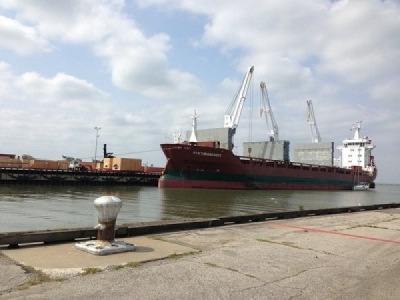
Posted on July 28, 2016
By Eric Heisig, Cleveland.com
The U.S. Army Corps of Engineers argued in a court filing that the money Congress budgeted for the dredging of the Cleveland Harbor and Cuyahoga River shipping channel allows for the Corps to make the ultimate decision on whether to dredge.
And as of now, the Corps has not decided whether dredging is necessary this year.
The document was filed Monday night in response to a request by the state of Ohio to have U.S. District Judge Donald Nugent in Cleveland force the Corps’ Buffalo District to fully dredge the six-mile shipping channel and put the sediment in a disposal facility.
Most important is what is known as the “sixth mile” of the channel, which serves ArcelorMittal’s steel mill and contains the bulk of the sediment that needs dredging. The state says delays in dredging would harm the business.
The state of Ohio and the Cuyahoga County Port Authority have asked a federal judge to again force the U.S. Army Corps of Engineers to fully dredge the Cleveland Harbor and Cuyahoga River shipping channel.
The Corps, as it did last year, is demanding that a “non-federal sponsor” pay to dump the dredged sediment into a disposal facility. It contends that the sediment is safe to be dumped into Lake Erie. The Ohio Environmental Protection Agency says dumping in the sediment in the lake would be harmful to the lake’s ecosystem.
Nugent forced the Corps to dredge last year. The Corps’ motion, filed by lawyers from the U.S. Justice Department and U.S. Attorney Carole Rendon’s office, argues that the judge was mistaken in several parts of his ruling.
According to the Corps, the statutory language associated with federal money allocated for maintaining the Great Lakes Shipping channels does not specifically say the Corps “shall dredge.” Rather, it says that the Army secretary “shall expedite the operation and maintenance, including dredging, of the navigation features of the Great Lakes and Connecting Channels.”
The filing also says that the Corps’ efforts to reduce its federal budget allocation for the Cleveland dredging project — which the state characterized as “an apparent subterfuge to circumvent this Court’s ruling” — is a common occurrence.
“Failure to adjust accordingly would have been inconsistent with the Federal Standard and an inaccurate representation of the Corps’ budgetary needs,” the filing says.
All of these arguments may be moot as the Corps says that the shipping channel might not need to be dredged. The Corps says it surveyed the lake on July 14 and that the channel’s waters are high enough for large watercraft to pass.
The state filed a lawsuit against the Corps last year over the Corps’ refusal to dredge.
Jade Davis, the Port of Cleveland’s vice president of external affairs, said Tuesday that the Corps is not telling the full story when it says the harbor may not need to be dredged. He said there isn’t as much sediment on the bottom as in past years because Cleveland’s summer has been relatively dry.
However, the harbor must still be dredged because it could impassible if the city sees a lot of rain, Davis said.
“If we get a few rainy days in a row, which is very possible, we will have ships that can’t get up the river that day,” Davis said.
Nugent was occasionally scathing when ordering the Corps to dredge the harbor in May 2015. The judge implied that the Corps was trying to blackmail the state into footing the bill of dumping sediment into a facility.
The U.S. Senate’s Permanent Subcommittee on Investigations, led by Republican Ohio Sen. Rob Portman, is investigating the actions Army officials took to cut the budget for the Cleveland dredging project.
And an appropriations bill the Senate passed in May included a provision banning the Corps from dumping dredged sediment into Lake Erie.
Source: cleveland.com





